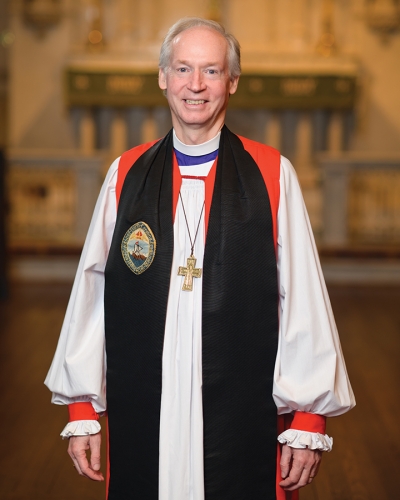To Differ is Divine:
Jan 25, 2023 |
Episode 1: To Differ Is Divine
| The Rt. Rev. Samuel Rodman, Rabbi Raachel Jurovics
Episode 1: To Differ Is Divine
To Differ is Divine grew out of the ongoing interfaith conversations between Bishop Sam Rodman, the bishop diocesan of North Carolina, and Rabbi Raachel Jurovics, the Diocese’s rabbi-in-residence and former leader of Yavneh: A Jewish Renewal Community in Raleigh. As Rabbi Raachel says, “If God wanted us all to be the same, we would all be the same. If it serves the divine purpose that we differ in our religious practices, then we have a responsibility to respond to that with an open heart.” In this first episode, they explore what we’re calling spiritual permeability, the invitation to look at the texts and practices of our respective faith traditions as a conversation between different expressions of God. Embracing spiritual permeability invites us not only into the life of the Spirit but into a dialogue as people of faith in a time of great divisions in the world. We believe these conversations are part of the divine gift.
Episode Notes: To Differ Is Divine
We’ve aggregated helpful resources and additional information about the religious writings, practices, symbols and thinkers discussed in this episode. We hope you’ll take the time to read them and learn a little bit more about an unfamiliar faith tradition–or maybe even your own.
Ma'Ariv Aravim
Ma’ariv Aravim is the first blessing before the Shema and generally the opening prayer of the Evening Service, or Ma’ariv. It is considered to be the parallel prayer to Yotzer Or, which is recited in the same place during the morning service (Shacharit). Just as Yotzer Or speaks of the coming of light, Ma’ariv Aravim speaks of the coming of darkness. These are considered the first preparatory blessings for the recitation of Shema and affirm our appreciation for God's Creation. Ma’ariv Aravim is a praise of God for bringing on the darkness, controlling the day and night, for ordering the stars in heaven, and for the seasons. While it is preferable to recite Ma’ariv after dusk, it is permissible to recite this blessing any time after sunset, even if dusk has not occurred yet:
Calendar of Saints
Like a few other Christian denominations, The Episcopal Church recognizes saints. Some–the St. Luke’s, St. Mary’s and St. Matthew’s of the early Church–are included in the Book of Common Prayer with special collects (prayers), psalms and other readings from Scripture assigned to them. Others who have been added to the calendar of saints within the last couple centuries, including familiar names like Pauli Murray, are included in Lesser Feasts and Fasts, a liturgical resource where you can find prayers and a short biographical sketch for each person commemorated. New commemorations may be added to the calendar with the approval of two General Conventions, the triennial gathering of The Episcopal Church. Unlike the Catholic church, evidence of miracles is not required for inclusion, just exemplary Christian witness.
Episode Notes: To Differ Is Divine
We’ve aggregated helpful resources and additional information about the religious writings, practices, symbols and thinkers discussed in this episode. We hope you’ll take the time to read them and learn a little bit more about an unfamiliar faith tradition–or maybe even your own.
Ma'Ariv Aravim
Ma’ariv Aravim is the first blessing before the Shema and generally the opening prayer of the Evening Service, or Ma’ariv. It is considered to be the parallel prayer to Yotzer Or, which is recited in the same place during the morning service (Shacharit). Just as Yotzer Or speaks of the coming of light, Ma’ariv Aravim speaks of the coming of darkness. These are considered the first preparatory blessings for the recitation of Shema and affirm our appreciation for God's Creation. Ma’ariv Aravim is a praise of God for bringing on the darkness, controlling the day and night, for ordering the stars in heaven, and for the seasons. While it is preferable to recite Ma’ariv after dusk, it is permissible to recite this blessing any time after sunset, even if dusk has not occurred yet:
Blessed are You, Adonai our God, Ruler of the universe,
who speaks the evening into being,
skillfully opens the gates,
thoughtfully alters the time and changes the seasons,
and arranges the stars in their heavenly courses according to plan.
You are Creator of day and night,
rolling light away from darkness and darkness from light,
transforming day into night and distinguishing one from the other.
Adonai Tz’vaot is Your Name.
Ever-living God, may You reign continually over us into eternity.
Blessed are You, Adonai, who brings on evening.
who speaks the evening into being,
skillfully opens the gates,
thoughtfully alters the time and changes the seasons,
and arranges the stars in their heavenly courses according to plan.
You are Creator of day and night,
rolling light away from darkness and darkness from light,
transforming day into night and distinguishing one from the other.
Adonai Tz’vaot is Your Name.
Ever-living God, may You reign continually over us into eternity.
Blessed are You, Adonai, who brings on evening.
Calendar of Saints
Like a few other Christian denominations, The Episcopal Church recognizes saints. Some–the St. Luke’s, St. Mary’s and St. Matthew’s of the early Church–are included in the Book of Common Prayer with special collects (prayers), psalms and other readings from Scripture assigned to them. Others who have been added to the calendar of saints within the last couple centuries, including familiar names like Pauli Murray, are included in Lesser Feasts and Fasts, a liturgical resource where you can find prayers and a short biographical sketch for each person commemorated. New commemorations may be added to the calendar with the approval of two General Conventions, the triennial gathering of The Episcopal Church. Unlike the Catholic church, evidence of miracles is not required for inclusion, just exemplary Christian witness.
